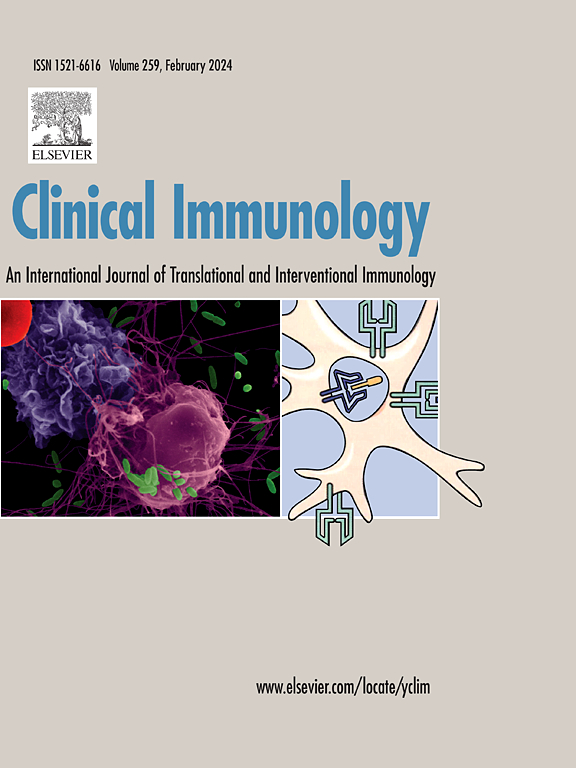依加替莫德对新发AChR亚型广泛性重症肌无力的标准治疗:一项前瞻性队列研究
IF 3.8
3区 医学
Q2 IMMUNOLOGY
引用次数: 0
摘要
Efgartigimod (EFG)常用于治疗病程较长的广泛性重症肌无力(gMG);新发gMG的益处尚不清楚。本研究纳入87例新发gMG患者,接受口服类固醇和免疫抑制治疗(常规组,n = 30)或联合EFG治疗(EFG组,n = 57)。主要结果是最小症状表达(MSE)应答者,以重症肌无力日常生活活动(MG-ADL)为0或1表示,持续4周以上。12周时,EFG组MSE应答者比例显著高于对照组(45.61%,26/57比13.33%,4/30,p = 0.0026)。在EFG组中,迟发性gMG患者的MG-ADL降低幅度大于胸腺瘤患者(7.06±3.25比4.96±3.40,p = 0.040)。脑电图可能是快速控制新发gMG疾病的一种有希望的治疗方法,但仍需要进一步的研究来评估成本效益和长期安全性。本文章由计算机程序翻译,如有差异,请以英文原文为准。
Efgartigimod versus standard of care in new-Onset AChR subtype generalized myasthenia gravis: A prospective cohort study
Efgartigimod (EFG) is usually used to treat generalized myasthenia gravis (gMG) with long disease duration; the benefit in new-onset gMG remained unknown. This study included 87 new-onset gMG patients who received either oral steroid and immunosuppressive treatment (Conventional group, n = 30) or combined with EFG (EFG group, n = 57). The primary outcome was minimal symptom expression (MSE) responders, as denoted by a Myasthenia Gravis Activities of Daily Living (MG-ADL) of 0 or 1 for over 4 weeks. At 12 weeks, the proportion of MSE responders was significantly higher in the EFG group (45.61 %, 26/57 vs. 13.33 %, 4/30, p = 0.0026). With the EFG group, patients with late-onset gMG had greater reductions in MG-ADL than those associated with thymoma (7.06 ± 3.25 vs. 4.96 ± 3.40, p = 0.040). EFG may be a promising treatment for rapid disease control in new-onset gMG, but future studies are still required to assess the cost-effectiveness and long-term safety.
求助全文
通过发布文献求助,成功后即可免费获取论文全文。
去求助
来源期刊

Clinical immunology
医学-免疫学
CiteScore
12.30
自引率
1.20%
发文量
212
审稿时长
34 days
期刊介绍:
Clinical Immunology publishes original research delving into the molecular and cellular foundations of immunological diseases. Additionally, the journal includes reviews covering timely subjects in basic immunology, along with case reports and letters to the editor.
 求助内容:
求助内容: 应助结果提醒方式:
应助结果提醒方式:


